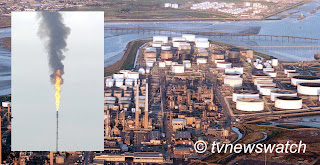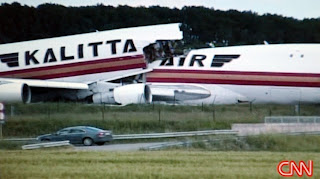
A grief stricken parent is pushed back as President Hu visits Beichuan
President Hu Jintao today visited areas struck by the devastating earthquake which has left at least 4.8 million people homeless and killed more than 20,000. On Friday afternoon a large aftershock caused further damage to buildings and cutting off routes to some areas. The 5.6 magnitude earthquake hit near to Miansizhen at 13:25 local time [05:25 GMT] and is the latest of more than 4,000 aftershocks. More than 200,000 buildings have been destroyed following the massive earthquake on Monday including 7,000 schools and the Chinese government has said investigations will be launched to see if building codes were ignored.
President Hu visited Beichuan today and said it was the worst earthquake to have hit China since 1949. China has suffered from some of the worst earthquakes in history. In 1976 the
Tangshan earthquake in Hebei province killed up to half a million people, and in 1927 a 7.9 magnitude earthquake in Gansu killed at least 40,000. More than 200,000 were killed only seven years previously when an 8.6 magnitude quake struck the Ningxia-Gansu region of China but the worst disaster was in 1556 when nearly one million died in the
Shaanxi Earthquake.
Following major earthquakes in recent history the Chinese authorities have toughened building regulations in earthquake zones. More than one third of all earthquakes hit China and most strike the southern province of Yunnan province. Following a 6.4 earthquake last year the provincial government announced a 10 year plan to make all houses able to resist a magnitude 6.0 earthquake. But the plan to replace houses will take some time with current projections looking at costs of more than ¥ 3 billion over the next 12 years. But the focus is now on Sichuan and questions are now being asked even by Chinese state media. The China Daily has already asked questions over the quality of building construction and the Chinese government has said anyone found to be responsible for substandard building work will be severely punished authorities have said. In an editorial published on Wednesday the paper said the “quality of school buildings raises disturbing questions”. The state run paper continues; “Tragic though the circumstances are, we cannot afford not to raise uneasy questions about the quality of school buildings”. The editorial adds that if “subsequent investigations indicate that most of the school buildings collapsed because of their poor-quality construction or the builders’ shoddy compliance with building rules, we must take a firm resolve to do away with man-made factors that are easily neglected in normal times but prove disastrous in an emergency”. The criticism also extended to the slow allocation of government funding to “renovate buildings so that they can withstand major quakes”. Some parents have expressed their anger at the building quality and told reporters that corners have been cut in the construction of some buildings. One man told the
AFP news agency, "I'll tell you why the school collapsed. It was shoddily built. Someone wanted to save money". One mother told reporters there were doubts about the construction of a school destroyed in Monday‘s quake. ''It was built in a very short time. They added one floor at a time, and continued building as they had money for it. So the base was not made for several floors. It was too weak. The whole building collapsed, straight down, hardly without shaking, even,'' she said [
BBC /
LA Times].
The disaster is all the more tragic with so many families losing their only child, a result of China’s controversial one child policy. It is unclear what proportion of the victims are children, but there are terrible scenes unfolding across the province as parents watch rescue workers pulling out hundreds of bodies from schools. In one of the worst cases, hundreds of students were feared buried in the debris of the Juyuan Middle School where more than 50 bodies have already been pulled out. At a newly built primary school that collapsed in Dujiangyan, just a flew kilometres away, 100 students and teachers were pulled out of the rubble but more than 100 remained buried on Wednesday. And at the main building of Beichuan Middle School in Mianyang city a little further to the north in Sichuan province, at least 1,000 students and teachers were dead and missing. The scene is repeated over and over again with an estimated 7,000 schools destroyed.
Amidst the sorrow there are brief moments of joy as some children are pulled alive from the rubble of collapsed buildings. But sadly the life for many survivors will never be the same. Besides the trauma and anxiety after living through such a disaster many have suffered terrible injuries. Countless victims have lost not only their homes but also their limbs. Infections have forced doctors to amputate arms and legs. One young boy asked doctors not to remove his arms because he wanted to go to school and would be able to hold his pencil. His sister tearfully told reporters that doctors said if they did not amputate his arms, her brother would die.
The story remains at the top of many news bulletins with some providing extensive coverage. The
BBC covered the story for nearly twenty minutes with Sky News giving around 8 minutes to the story.
CNN has also given over a large proportion of air time to the unfolding tragedy, but the largest coverage has been on the Chinese state broadcaster CCTV. The type of broadcasting seen on Chinese television is unprecedented.
Studio discussions and live reports from affected areas have filled the air time and many people in China have been glued to the coverage. Some have spoken of how the images have left them tearful and with sore eyes, while others have talked of being motivated to help. Thousands have joined queues to give blood and donations of food, water and money have poured in from all parts of the country. More than ¥ 20 million has already been donated by the public.
As some Western media focuses on whether building regulations were flouted there is little discussion as to how much the West is prepared for such a disaster. Although rare, earthquakes can and do occur in Europe. Speaking to
Swiss Info, Thomas Wenk, chairman of the Swiss Society for Earthquake Engineering and Structural Dynamics, has said while Switzerland is in a lower risk category than most of China, an earthquake of similar strength could occur in other parts of Europe. “I am not a seismologist, but in Europe an earthquake on that scale could only be imagined in the main risk areas towards Turkey and Asia,” Wenk said. A small earthquake earlier this year caused relatively minor but widespread damage in the UK, but there are examples where natural disasters have overwhelmed authorities in the West.
Hurricane Katrina killed more than 1,800 people in the United States in 2005 and the government was widely criticised for its poor response to the disaster. The area affected by the Wenchuan earthquake is massive and the damage is beyond imagination. Whilst efforts to make buildings ‘earthquake proof’, there is no sure way to prevent deaths occurring following such a massive disaster. Japan, which has stringent regulations concerning the construction of buildings and infrastructure, was severely hit by the
Kobe earthquake in 1995 killing over 6,000.
Perhaps the most critical reports have come from Channel Four News which talks of ‘palm greasing’ and corruption as being responsible for the poor building standards. Today they showed pictured of angry parents in grief from having lost their only child. “My colleagues and I at the Ministry of Housing feel very sad to see that. I was also heavy hearted when I saw those students being pulled out. So if we find the collapsed buildings have quality problems after our investigation we will definitely seal with it aggressively” said Jiang Weixin. But it is little consolation to those who have lost loved ones. And as President Hu visited Beichuan today grieving parents were pushed away by police and security guards as they attempted to approach him to air their case. The cameraman who was filming was also stopped from filming further.
Weather is still hampering rescue efforts in many parts of Sichuan causing further landslides and there are fears increased water levels may put greater pressure on dams across the province. Up to 300 dams are said to be affected by the earthquakes and troops are working to make them safe. Any breaches would certainly bring further tragedy to an already devastated region.







































